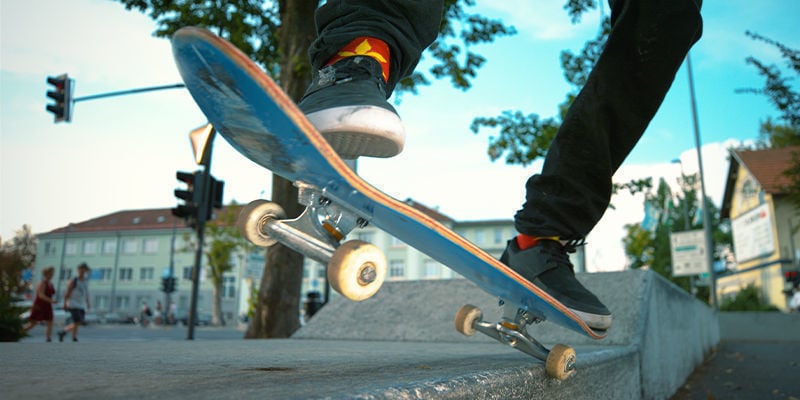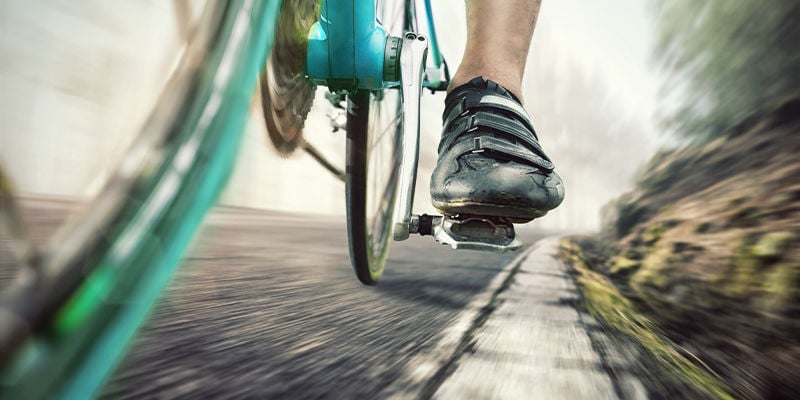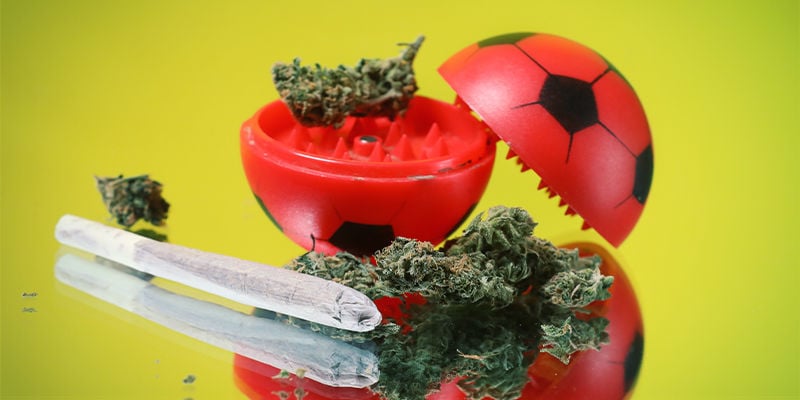
The Effects Of Weed On Sports Performance
Weed is well-known for making movies and music more enjoyable, and for making socialising with friends even better. But what benefit (if any) is there to using weed alongside physical activity and sports? Keep reading as we dive deep into the world of cannabis and sports performance.
Many people are no stranger to using weed to enhance daily life. However, have you ever considered a quick smoke before a gym session or edibles as a post-run snack? For most, the answer is no, but as we'll soon discover, there could be several benefits to mixing cannabis with your favourite physical activities.
Working out with weed

Before taking a closer look at the influence of weed on sports performance, we first need to establish what it is we're trying to achieve—which sport-related attributes do we want to improve? For some people, it's reaching a new 1-rep max; for others, it's having the mental fortitude to beat their previous run time or pace.
We also can't forget about an equally critical part of sports performance that comes after the event—recovery. Recovering from a workout is essential to preventing injury, increasing muscle mass, and leading a healthy, movement-filled lifestyle. So, where exactly could cannabis fit into the complex topic of sports performance?
Well, as it turns out, weed could be a blessing and a curse, depending on your fitness goals. Or, to put it more scientifically, weed could be both ergogenic and ergolytic.
Ergogenic vs ergolytic
The terms ergogenic and ergolytic may seem over the top for an article discussing weed and sports; still, as we'll find out, many cannabis-related studies use these terms to discuss the formal implications of drug use in sports (Eichner, 1993).
-
Ergogenic: Any substance that enhances performance, energy production, protein synthesis, or recovery. The drugs used aren't always illicit (caffeine, for example), but most professional sports regulate the intake of ergogenic substances.
-
Ergolytic: If a substance impairs performance in any way, it's considered ergolytic. This could be alcohol, tobacco, and, in some cases, marijuana.
The effects of cannabis on sports performance
Knowing what sports performance means and how different substances are categorised, it's time to bring cannabis into the fold. In keeping with the sport-related attributes highlighted above, we'll examine the outcomes of cannabis-related research in three key areas: endurance, recovery, and cognitive function.
Cannabis and endurance

Endurance, or "the ability to endure", is a key concern for athletes. Hell, it's a key concern for most people, as many of us would relish the chance to last a few extra minutes doing the things we love. So should we turn to weed for help?
According to a review published in the Journal of Cannabis Research, the answer is complicated (Kramer et al., 2020). Kramer and associates outline that "advantages may plausibly be conveyed by psychotropic enhancement or pain reduction". In essence, the general effects of cannabis could help an athlete push themselves further, supporting maximal exercise performance.
However, by measuring VO₂max (maximum oxygen uptake) and PWC (physical work capacity), both strong indicators of physical performance, researchers failed to observe any difference between control groups and chronic cannabis users.
We should highlight that at the time of the review's publication, only four studies met its strict criteria, so it's difficult to give a definite answer on the topic. It seems the only way to find out might be to take a long nature run with some decent music and a joint in tow.
Cannabis and muscle recovery

Many athletes and coaches consider recovery the most crucial aspect of sports performance. After all, consistency of training is essential to physical development. However, when it comes to getting quality rest, it looks like we should focus on high-CBD strains and CBD-focused products rather than high-THC cannabis.
A comprehensive review examined the effects of THC and CBD on athletic performance and recovery. While THC was generally associated with greater risk to reward (getting too high to remember your sets and reps, for example), CBD showed a much more favourable profile (Burr et al., 2021).
Researchers concluded that "the use of CBD by athletes is likely more relevant to recovery during training and while in competition", adding it shows some promise "through a number of potential mechanisms". CBD's greatest strength appears to be its lack of notable side effects, making it a much more versatile choice.
Cannabis and cognitive function

One final aspect of physical performance to consider in relation to cannabis is cognitive function. While there's no denying that technique and hard work are pivotal to performing at the highest level, mental resilience plays a significant part in pushing through plateaus.
Again, it seems that CBD takes the limelight here, with a review published in Sports Medicine outlining the potential impact of cannabidiol (CBD) on athletic factors such as sleep, pain, thermoregulation, sports performance anxiety, and stress (McCartney et al., 2020).
Ultimately, though, the review reaches similar conclusions to those we've already seen—the available evidence is preliminary and at times inconsistent. While they acknowledge that "CBD has been reported to exert a number of physiological, biochemical, and psychological effects that have the potential to benefit athletes", more rigorous controlled clinical trials are needed.
How to use cannabis for sports performance

The bioavailability of a product, its concentration, and the duration of its effects all play a pivotal role in successfully matching weed with your favourite sporting activities. Below are details of how the most popular consumption methods could fit around sports training.
Smoking
Although smoking is still one of the most popular options for consuming cannabis, it's not one we'll explore in great detail. Generally, smoking brings a host of nasty substances that can ruin the outcome of physical activity.
If you're focused on something simple like keeping up your step count, then a joint and a stroll through the woods sounds like a great idea. However, for everything else, it's probably best to leave the pre-rolls till after the event.
Edibles
Regular gym-goers are no stranger to a pre-workout snack, but if you're thinking of adding cannabis to the equation, you'll need to consider both the strength and the delayed onset of edibles.
Edibles are notorious for knocking even the most seasoned stoner on their arse (literally and figuratively), so establishing a baseline dose is essential. However, perhaps the most critical consideration for blending edibles with sports training is not dose, but timing—specifically how close to your training session you eat them.
It can take up to an hour for THC to reach your bloodstream, so you'll need to time pre-workout snacks carefully. Ideally, you'll want the peak of your high to start when you begin your working sets, so you don't disturb warming up and stretching. Finally, many edibles are high in calories, so you'll have to decide whether they align with your fitness goals.
Vaping
Vaping cannabis brings with it two significant benefits: intensity and onset speed—which is around 10 minutes. With vaping, it's somewhat possible to tailor your cannabis use to a specific exercise or workout, as you could start with a THC-rich strain before switching to something CBD-centric post-workout. Depending on your fitness goals, you could even try a strain with an equal ratio of THC and CBD to capitalise on their synergy.
CBD oil
Technically, CBD oil isn't a consumption method, but given the clear focus on cannabidiol in the research highlighted above, it makes sense to explore the product in more detail. The benefit of CBD oil is the option to tweak bioavailability, choosing between sublingual or oral consumption.
Sublingual intake has a faster onset, while oral consumption lasts longer, but you'll have to wait roughly 45–60 minutes to feel the effects. In terms of which you might choose, again, it depends entirely on the sport, activity, or goal.
Just remember, most of the research surrounding CBD focuses on recovery, so if you already have a decent post-workout routine (sleep, stretching, and nutrition), you may not notice a significant improvement.
Drug testing in sports: THC and CBD

Recreationally, it's up to you to decide if cannabis is a good fit for supporting sports performance. However, for both established and novice athletes, knowing where you stand with drug testing and illicit substances is essential. Whether we agree with it or not, cannabis has a tenuous relationship with professional sporting organisations.
THC
The situation with THC and professional athletes is clear; the cannabinoid is strictly prohibited, regardless of where it comes from or how you consume it. For example, the US Anti-Doping Agency states:
"The WADA Prohibited List identifies marijuana and cannabinoids as substances that are prohibited in competition".
These rules apply even in states or countries where cannabis and THC are legal, so if in doubt, steer clear. With any specific questions about cannabis use, it's best to speak directly to your sport's governing body.
CBD
Fortunately, the situation with CBD is much more accommodating, as the World Anti-Doping Agency no longer lists the cannabinoid as a prohibited substance. As a result, most sporting institutions allow their athletes to use CBD.
However, there are a couple caveats athletes should be aware of:
-
First, while CBD itself isn't prohibited, CBD flower or untested CBD products could contain unacceptable levels of THC.
-
Second, even if you find a product you trust, many sporting bodies recommend getting said products independently tested to verify the contents. This precautionary step brings with it an extra layer of complication and financial cost.
What are the risks of cannabis for sports performance?

Having talked extensively about the potential benefits and practical applications of pairing weed with sports, it's time to discuss the risks. Regarding legality, we'll leave the finer details to you, as it's impossible to predict all the different outcomes worldwide.
Assuming you're happy to use cannabis alongside sports, the most immediate risk to consider is a possible injury. There's no denying that THC skews reaction time and perception, which, combined with heavy weights, is asking for trouble. Fortunately, however, the similarities between a cannabis high and the famed "runner's high" mean the herb might be a much better fit for aerobic exercises.
There's also a lack of qualitative data to support cannabis use in sports. From a purely scientific point of few, the potential benefits seem few and far between. However, the beauty of cannabis is that no two experiences are the same, and research cannot examine every outcome. Some people love eating edibles or vaping before a run, while others find a mellowing high perfect as a post-workout treat. While we wait for more extensive human trials, it appears that the effects of weed on sports performance differ on a case-by-case basis!
- Burr, J. F., Cheung, C. P., Kasper, A. M., Gillham, S. H., & Close, G. L. (2021, September). Cannabis and athletic performance. Sports medicine (Auckland, NZ). - https://www.ncbi.nlm.nih.gov
- Eichner ER. (1993 Feb). Ergolytic drugs in medicine and sports - https://pubmed.ncbi.nlm.nih.gov
- Kramer, Andrew, Sinclair, Justin, Sharpe, Lara, Sarris, & Jerome. (2020, December). Chronic cannabis consumption and physical exercise performance in healthy adults: a systematic review - https://jcannabisresearch.biomedcentral.com
- McCartney, Danielle, Benson, Melissa J., Desbrow, Ben, Irwin, Christopher, Suraev, Anastasia, McGregor, & Iain S. (2020, December). Cannabidiol and Sports Performance: a Narrative Review of Relevant Evidence and Recommendations for Future Research - https://sportsmedicine-open.springeropen.com
-
 5 min
13 January, 2023
Best Cannabis Strains To Boost Sports Performance & Recovery
Though cannabis might not be immediately associated with working out, perhaps it should be! Here we break down the best strains to support athletic performance and recovery before, during, and...
5 min
13 January, 2023
Best Cannabis Strains To Boost Sports Performance & Recovery
Though cannabis might not be immediately associated with working out, perhaps it should be! Here we break down the best strains to support athletic performance and recovery before, during, and...
-
 5 min
6 September, 2019
Top 10 Best Cannabis Strains
Ever wondered what our favourite cannabis strains are here at Zamnesia? Wonder no longer, we have put together a list of our top 10.
5 min
6 September, 2019
Top 10 Best Cannabis Strains
Ever wondered what our favourite cannabis strains are here at Zamnesia? Wonder no longer, we have put together a list of our top 10.













 United States
United States










